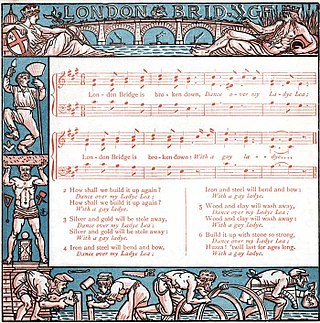
"London Bridge Is Falling Down" is a traditional English nursery rhyme and singing game, which is found in different versions all over the world. It deals with the dilapidation of London Bridge and attempts, realistic or fanciful, to repair it. It may date back to bridge-related rhymes and games of the Late Middle Ages, but the earliest records of the rhyme in English are from the 17th century. The lyrics were first printed in close to their modern form in the mid-18th century and became popular, particularly in Britain and the United States, during the 19th century.

Epiousion (ἐπιούσιον) is a Koine Greek adjective used in the Lord's Prayer verse "Τὸν ἄρτον ἡμῶν τὸν ἐπιούσιον δὸς ἡμῖν σήμερον". Because the word is used nowhere else, its meaning is unclear. It is traditionally translated as "daily", but most modern scholars reject that interpretation. The word is also referred to by epiousios, its presumed lemma form.

"Sing a Song of Sixpence" is an English nursery rhyme, perhaps originating in the 18th century. It is listed in the Roud Folk Song Index as number 13191. The sixpence in the rhyme is a British coin that was first minted in 1551.

Matthew 3:2 is the second verse of the third chapter of the Gospel of Matthew in the New Testament. John the Baptist has been introduced in the first verse and this verse describes the message that he is preaching. Through John's message, Matthew introduces the "Kingdom of Heaven".

Matthew 5 is the fifth chapter of the Gospel of Matthew in the New Testament. It contains the first portion of the Sermon on the Mount, the other portions of which are contained in chapters 6 and 7. Portions are similar to the Sermon on the Plain in Luke 6, but much of the material is found only in Matthew. It is one of the most discussed and analyzed chapters of the New Testament. Warren Kissinger reports that among early Christians, no chapter was more often cited by early scholars. The same is true in modern scholarship.
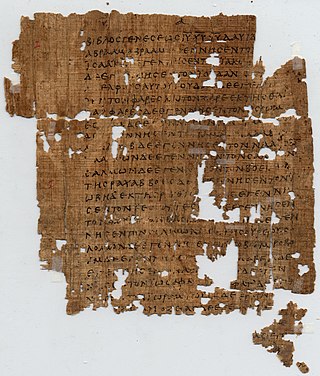
Matthew 24 is the twenty-fourth chapter of the Gospel of Matthew in the New Testament of the Christian Bible. It commences the Olivet Discourse or "Little Apocalypse" spoken by Jesus Christ, also described as the Eschatological Discourse, which continues into chapter 25. It contains Jesus' prediction of the destruction of the Temple in Jerusalem. Mark 13 and Luke 21 also cover the same material.
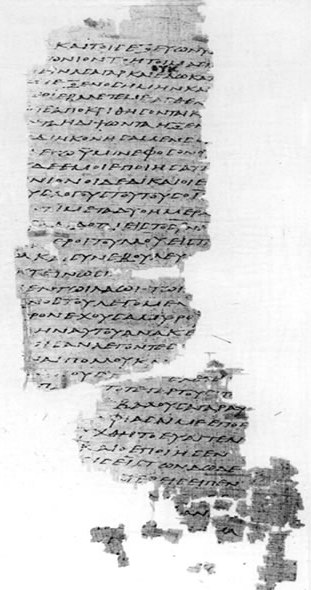
Matthew 25, the twenty-fifth chapter of the Gospel of Matthew, continues the Olivet Discourse or "Little Apocalypse" spoken by Jesus Christ, also described as the Eschatological Discourse, which had started in chapter 24.

"There Was an Old Woman Who Lived in a Shoe" is a popular English language nursery rhyme, with a Roud Folk Song Index number of 19132. Debates over its meaning and origin have largely centered on attempts to match the old woman with historical female figures who have had large families, although King George II (1683–1760) has also been proposed as the rhyme's subject.

Matthew 28 is the twenty-eighth and final chapter of the Gospel of Matthew in the New Testament. This chapter records that Jesus is risen, describes the actions of the first witnesses to this event, and ends with the Great Commission.

Matthew 11 is the eleventh chapter in the Gospel of Matthew in the New Testament section of the Christian Bible. It continues the gospel's narrative about Jesus' ministry in Galilee.

Matthew 12 is the twelfth chapter in the Gospel of Matthew in the New Testament section of the Christian Bible. It continues the narrative about Jesus' ministry in Galilee and introduces controversy over the observance of the Sabbath for the first time.
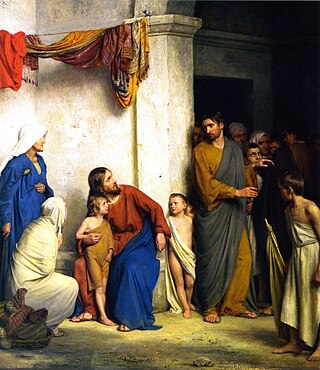
Chapter 18 of the Gospel of Matthew contains the fourth of the five Discourses of Matthew, also called the Discourse on the Church or the ecclesiastical discourse. It compares "the greatest in the Kingdom of Heaven" to a child, and also includes the parables of the lost sheep and the unforgiving servant, the second of which also refers to the Kingdom of Heaven. The general themes of the discourse are the anticipation of a future community of followers, and the role and "spiritual condition" of his apostles in leading it.

Matthew 20 is the twentieth chapter in the Gospel of Matthew in the New Testament of the Christian Bible. Jesus continues his final journey through Perea and Jericho, heading towards Jerusalem, which he enters in the following chapter.

Matthew 21 is the twenty-first chapter in the Gospel of Matthew in the New Testament section of the Christian Bible. Jesus triumphally or majestically arrives in Jerusalem and commences his final ministry before his Passion.
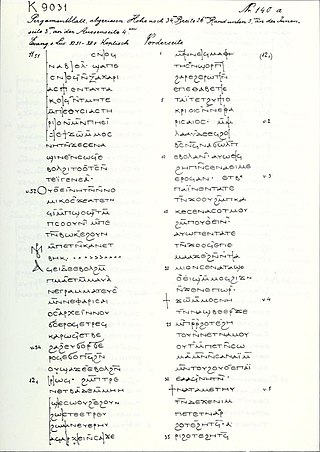
Luke 12 is the 12th chapter of the Gospel of Luke in the New Testament of the Christian Bible. It records a number of teachings and parables told by Jesus Christ when "an innumerable multitude of people had gathered together", but addressed "first of all" to his disciples. The book containing this chapter is anonymous, but early Christian tradition uniformly affirmed that Luke the Evangelist composed this Gospel as well as the Acts of the Apostles.

Luke 14 is the fourteenth chapter of the Gospel of Luke in the New Testament of the Christian Bible. It records one miracle performed by Jesus Christ on a Sabbath day, followed by his teachings and parables, where he "inculcates humility ... and points out whom we should invite to our feasts, if we expect spiritual remuneration". The book containing this chapter is anonymous, but early Christian tradition uniformly affirmed that Luke the Evangelist composed this Gospel as well as the Acts of the Apostles.
Matthew 11:17 is the seventeenth verse in the eleventh chapter of the Gospel of Matthew in the New Testament.
Ann Stephens was a British child actress and singer, popular in the 1940s. She was born in London. In July 1941 she recorded several songs, including a popular version of "The Teddy Bears' Picnic", "Dicky Bird Hop" and a setting by Harold Fraser-Simson of one of A. A. Milne's verses about Christopher Robin, "Buckingham Palace," which was often featured on the BBC Light Programme's Children's Favourites. In the same year Stephens had made her recording debut as Alice in musical adaptations of Lewis Carroll's Alice's Adventures in Wonderland and Through the Looking Glass. She was chosen for this role from some 700 applicants auditioned by the record company His Master's Voice.
Rhymed psalters are translations of the Psalms from Hebrew or Latin into poetry in some other language. Rhymed psalters include metrical psalters designed for singing, but are not limited to that use.

Ge rum i Bröllopsgåln din hund! is Epistle No. 40 in the Swedish poet and performer Carl Michael Bellman's 1790 song collection, Fredman's Epistles. One of his best-known works, it describes an utterly chaotic wedding at a venue where soldiers mixed up with musicians and the wedding-party; the chimney catches fire, and even the priest robs the collection. The verse-pattern and elaborate rhyming scheme combine to assist the feeling of chaos.
















